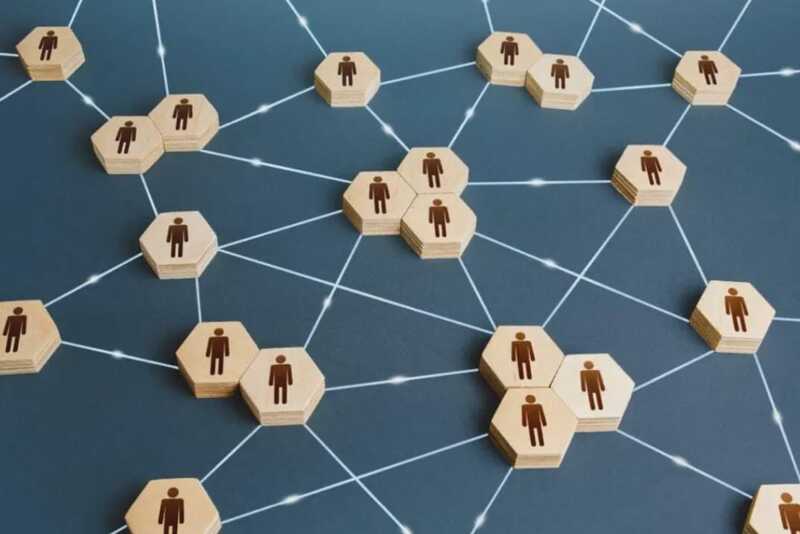 A network of interconnected entities or individuals resembling a blockchain. Photo Credits: Andrii Yalanskyi via Dreamstime
A network of interconnected entities or individuals resembling a blockchain. Photo Credits: Andrii Yalanskyi via Dreamstime
Blockchain: A Beacon Of Hope For Africa's Heathcare Sector
Technology continues to shape various sectors across Africa, with the health sector steadily embracing digital innovations. By integrating information communication systems, African healthcare systems are beginning to better understand and manage structures, processes, and patient care.
Blockchain: A Game-Changer for Healthcare
Among the latest technological breakthroughs, blockchain stands out for its decentralized, transparent, efficient, and secure nature. This technology enables individuals to access services without control by any central authority—making it a transformative solution in healthcare delivery.
Tackling Fragmented Health Records with Blockchain
Most healthcare institutions in Africa still depend on fragmented, paper-based medical records. These systems are prone to human error, such as misfiled documents or even loss of critical patient information. Blockchain can address these issues by providing tamper-proof digital records. Moreover, it allows seamless sharing of medical records between healthcare providers, leading to improved diagnoses and continuity of care.
Curbing Counterfeit Drugs and Strengthening the Supply Chain
Africa faces serious challenges in regulating drug supply chains. Cases of counterfeit or banned medications reaching patients are widespread. Blockchain technology can create a transparent and traceable drug supply chain—from manufacturers to end users—ensuring that only approved medications reach pharmacies and hospitals. This would increase patient safety and improve trust in healthcare systems.
Streamlining Payments and Patient Admissions
One of the most fatal flaws in African healthcare is the slow and often chaotic patient admission process, frequently caused by inefficient payment systems. Blockchain can simplify these systems by enabling fast, secure, and transparent transactions that are instantly accessible to all relevant departments. This would improve admission times, reduce costs, and potentially save lives.
Adoption of Blockchain Across African Countries
Some African countries are already pioneering blockchain use in healthcare.
Blockchain: A Game-Changer for Healthcare
Among the latest technological breakthroughs, blockchain stands out for its decentralized, transparent, efficient, and secure nature. This technology enables individuals to access services without control by any central authority—making it a transformative solution in healthcare delivery.
Tackling Fragmented Health Records with Blockchain
Most healthcare institutions in Africa still depend on fragmented, paper-based medical records. These systems are prone to human error, such as misfiled documents or even loss of critical patient information. Blockchain can address these issues by providing tamper-proof digital records. Moreover, it allows seamless sharing of medical records between healthcare providers, leading to improved diagnoses and continuity of care.
Curbing Counterfeit Drugs and Strengthening the Supply Chain
Africa faces serious challenges in regulating drug supply chains. Cases of counterfeit or banned medications reaching patients are widespread. Blockchain technology can create a transparent and traceable drug supply chain—from manufacturers to end users—ensuring that only approved medications reach pharmacies and hospitals. This would increase patient safety and improve trust in healthcare systems.
Streamlining Payments and Patient Admissions
One of the most fatal flaws in African healthcare is the slow and often chaotic patient admission process, frequently caused by inefficient payment systems. Blockchain can simplify these systems by enabling fast, secure, and transparent transactions that are instantly accessible to all relevant departments. This would improve admission times, reduce costs, and potentially save lives.
Adoption of Blockchain Across African Countries
Some African countries are already pioneering blockchain use in healthcare.
- Kenya is applying blockchain in managing its medical supply chain, which has reduced incidences of shortages and counterfeit drugs.
- Nigeria utilizes blockchain to track drug deliveries to remote areas, ensuring timely and secure distribution.
- South Africa is also exploring blockchain applications in medical data management and service delivery.
Barriers to Adoption: Infrastructure, Regulation, and Education
Despite its potential, the widespread use of blockchain in Africa’s health sector is hindered by inadequate technological infrastructure, lack of clear regulatory policies, and cybersecurity vulnerabilities. Moreover, awareness of blockchain technology remains limited among healthcare professionals and the general public.
The Need for Training and Awareness
To unlock blockchain’s full potential, there is a need for educational campaigns targeting healthcare workers and policymakers. Training programs can equip them with the knowledge required to integrate blockchain effectively into healthcare systems. Additionally, patients need to be educated on how to securely access and manage their digital health records.
A Step Away from Transformation
Blockchain could revolutionize Africa’s healthcare sector by offering innovative solutions to long-standing challenges. With strategic investments in infrastructure, policy development, and education, the continent stands on the brink of a healthcare transformation driven by secure, transparent, and efficient blockchain technology.
Senior Editor: Kenneth Njoroge
Financial Expert/Bsc. Commerce/CPA
